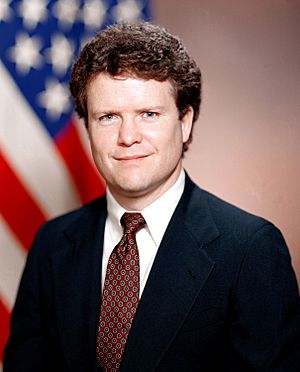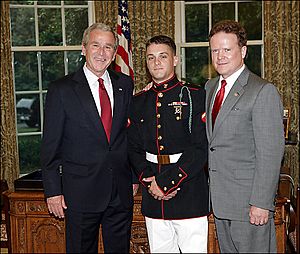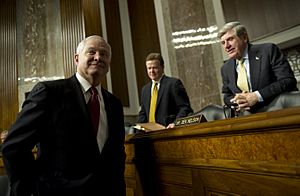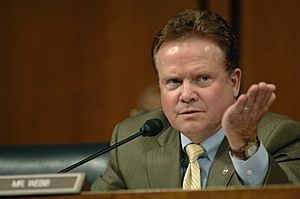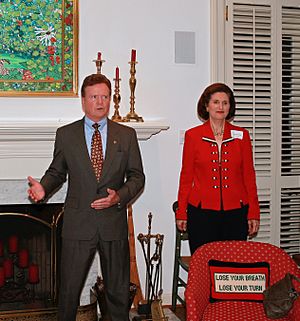Jim Webb facts for kids
Quick facts for kids
Jim Webb
|
|
|---|---|
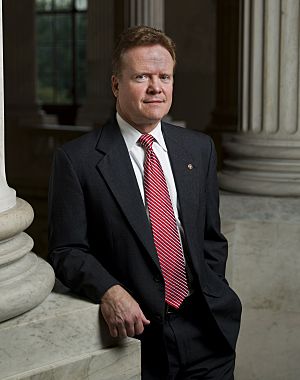
Official portrait, 2007
|
|
| United States Senator from Virginia |
|
| In office January 3, 2007 – January 3, 2013 |
|
| Preceded by | George Allen |
| Succeeded by | Tim Kaine |
| 66th United States Secretary of the Navy | |
| In office May 1, 1987 – February 23, 1988 |
|
| President | Ronald Reagan |
| Preceded by | John Lehman |
| Succeeded by | William Ball |
| 1st Assistant Secretary of Defense for Reserve Affairs | |
| In office May 3, 1984 – April 10, 1987 |
|
| President | Ronald Reagan |
| Preceded by | Position established |
| Succeeded by | Stephen Duncan |
| Personal details | |
| Born |
James Henry Webb Jr.
February 9, 1946 St. Joseph, Missouri, U.S. |
| Political party | Democratic (since 2006) |
| Other political affiliations |
Republican (before 2006) |
| Spouses |
Barbara Samorajczyk
(m. 1968; div. 1979)Jo Ann Krukar
(m. 1981; div. 2004)Hong Le Webb
(m. 2005) |
| Children | 6 (1 stepchild) |
| Education | United States Naval Academy (BS) Georgetown University (JD) |
| Signature |  |
| Military service | |
| Allegiance | United States |
| Branch/service | |
| Years of service | 1968–1972 |
| Rank | |
| Unit | Delta Company, 1st Battalion 5th Marines |
| Battles/wars | Vietnam War (WIA) |
| Awards |
|
James Henry Webb Jr. (born February 9, 1946) is an American politician and author. He has held important roles in the U.S. government. These include serving as a United States senator for Virginia and as the Secretary of the Navy. He was also an officer in the Marine Corps.
Webb has written ten books and worked as a journalist and filmmaker. He taught at the United States Naval Academy. He was a member of the Republican Party before joining the Democratic Party in 2006. In 2015, he ran for the Democratic nomination for President of the United States.
In 2020, Webb became the first distinguished fellow at the University of Notre Dame's International Security Center.
Contents
Early Life and Education
Jim Webb was born in St. Joseph, Missouri. His father was in the United States Air Force, so his family moved often. They lived in many states and even in England. His father flew planes in World War II and helped with the Berlin airlift.
Webb's family history is from Scots-Irish immigrants. His 2004 book, Born Fighting: How the Scots-Irish Shaped America, talks about his family fighting in every major American war. A TV show on the Smithsonian Channel was also made from his book.
Webb went to many schools. He attended the University of Southern California and then the United States Naval Academy in Annapolis, Maryland. He graduated from the Naval Academy in 1968. After serving in the Marine Corps, he studied law at Georgetown University.
Military Service
After graduating from the Naval Academy, Webb became a second lieutenant in the U.S. Marine Corps. He was a platoon commander in Vietnam. He showed great bravery and received several awards.
He was awarded the Navy Cross, which is the second-highest award for bravery in the Navy and Marine Corps. He also received the Silver Star, two Bronze Stars, and two Purple Hearts. The Purple Heart is given to those wounded in combat.
After Vietnam, Webb became an instructor at Officer Candidates School. He later worked in the Secretary of the Navy's office. He retired from the Marine Corps due to injuries he received in Vietnam.
Military Awards and Decorations
Here are some of the awards and medals Jim Webb received:
| Navy Cross | Silver Star | Bronze Star | Purple Heart | ||||||||
| Achievement Medal | Combat Action Ribbon | National Defense Service Medal | Vietnam Campaign Medal |
Webb received the Navy Cross for his actions on July 10, 1969. He showed great courage while leading his platoon. He captured enemy soldiers and cleared bunkers. He also protected a fellow Marine from an explosion, even though he was wounded himself.
His Silver Star was for bravery on May 9, 1969. He led a team to help a patrol that was under attack. He risked his own safety to rescue wounded Marines. His actions helped save lives and stop an enemy attack.
After Military Service
After his military service, Webb attended Georgetown University Law Center. He earned a law degree in 1975. While studying, he wrote his first book about U.S. strategy in the Pacific.
From 1977 to 1981, Webb worked for the House Committee on Veterans Affairs. He also helped veterans for free.
During the Reagan Administration, Webb served as the first Assistant Secretary of Defense for Reserve Affairs from 1984 to 1987. In 1987, he became Secretary of the Navy. He was the first Naval Academy graduate to lead the Navy as a civilian. He resigned in 1988 because he disagreed with plans to reduce the Navy's size.
Webb often shared his thoughts on military matters. Before the 2003 Iraq War, he wrote an article for The Washington Post. He questioned if removing Saddam Hussein would help fight terrorism. He also warned that there was no clear plan for leaving Iraq. He believed American troops might become targets.
In 2004, during the presidential election, Webb wrote about the candidates. He criticized the 2003 invasion of Iraq, calling it a major mistake.
United States Senate
2006 Senate Campaign
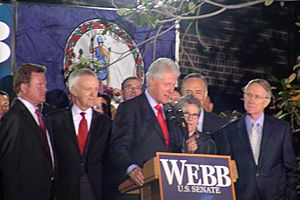
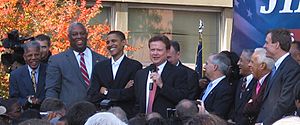
In 2005, people online started encouraging Webb to run for the Senate. On February 7, 2006, he announced he would seek the Democratic nomination. He ran against the sitting Senator, George Allen.
Webb won the Democratic primary election on June 13, 2006. The election against George Allen became very close. Webb's campaign gained support after an incident where Allen used a word that was seen as offensive.
Webb won the election on November 9, 2006. The difference in votes was very small. Allen decided not to ask for a recount.
Senator-elect
After winning, Webb was assigned to three important committees: Foreign Relations, Veterans' Affairs, and Armed Services.
Webb also wrote an article for The Wall Street Journal. He discussed economic inequality in the U.S. He pointed out how globalization, outsourcing, and rising healthcare costs affected American workers.
Exchange with President George W. Bush
On November 28, 2006, Webb had a notable exchange with President George W. Bush. Webb's son was a Marine serving in Iraq. When President Bush asked about his son, Webb replied that he wanted to bring the troops home from Iraq. Bush repeated his question, and Webb said it was a private matter.
This exchange caused some discussion. Some people criticized Webb, while others supported him. Webb later said the event was "overblown." He explained that his feelings about his son's service were very personal.
After his son returned from Iraq, Webb and President Bush met privately with Webb's son. This helped them move past their earlier disagreement.
Time as Senator
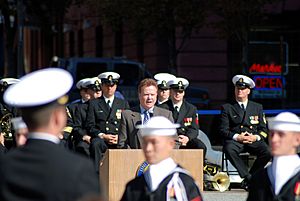
On January 3, 2007, Webb officially became a U.S. Senator. On his first day, he introduced a bill called the Post-9/11 Veterans Educational Assistance Act of 2008. This bill aimed to expand benefits for military families. It would give veterans benefits similar to those soldiers received after World War II. This bill became law in June 2008.
Webb also spoke about the Iraq War. He believed the U.S. needed a clear strategy to remove combat troops. He wanted to increase stability in the region and continue fighting international terrorism.
On January 23, 2007, Webb gave the Democratic response to the President's speech. He focused on the economy and the war in Iraq. His speech was well-received.
On March 5, 2007, Webb introduced another bill. It aimed to stop military operations in Iran without Congress's approval. He believed Congress should approve such actions.
2009 Visit to Southeast Asia
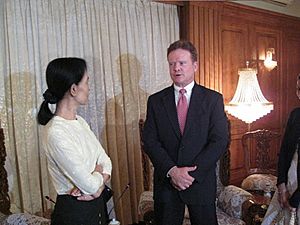
On August 14, 2009, Webb visited Myanmar (Burma). He met with the country's leader and also with pro-democracy leader Aung San Suu Kyi. During his visit, Webb helped secure the release of an imprisoned American.
After his trip, Webb wrote an article for The New York Times. He argued for easing sanctions on Myanmar. He believed sanctions had pushed Myanmar closer to China. Webb has been involved in Asian affairs for many years. He can speak Vietnamese.
Criminal Justice Commission Act of 2009
On March 26, 2009, Webb introduced the Criminal Justice Commission Act of 2009. This bill would create a group to study the criminal justice system. The goal was to suggest reforms. Webb noted that the U.S. has a very high number of people in prison compared to other countries. He wanted to compare U.S. policies with those of other developed nations.
The bill gained support in the Senate. However, it did not become law.
Retirement from the U.S. Senate
On February 9, 2011, Webb announced that he would not run for re-election in 2012.
Committee Assignments
During his time in the Senate, Jim Webb served on several important committees:
- Committee on Armed Services
- Subcommittee on Personnel (Chairman)
- Committee on Foreign Relations
- Subcommittee on East Asian and Pacific Affairs (Chairman)
- Committee on Veterans' Affairs
- Joint Economic Committee
2016 Presidential Campaign
On November 19, 2014, Webb announced he was exploring a possible run for President in 2016. He made a formal announcement on July 2, 2015, that he would seek the Democratic Party's nomination.
However, on October 20, 2015, Webb announced he was leaving the Democratic presidential race. He felt uncomfortable with some of the party's leadership positions. He later decided not to run as an independent candidate either.
As an Author
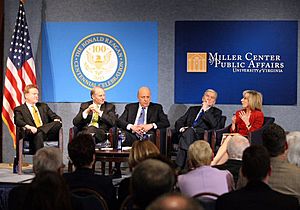
Jim Webb is a successful author. His first novel, Fields of Fire (1978), is based on his experiences as a Marine in Vietnam. Reviewers praised its descriptions of military life and combat.
He has written several other novels. His book Born Fighting: How the Scots-Irish Shaped America (2004) explores the history and culture of Scots-Irish Americans.
Books
- Micronesia and United States Pacific Strategy: Blueprint for the 1980s (1975)
- Fields of Fire (1978)
- A Sense of Honor (1981)
- A Country Such as This (1983)
- Something to Die For (1992)
- The Emperor's General (1999)
- Lost Soldiers (2002)
- Born Fighting: How the Scots-Irish Shaped America (2004)
- A Time to Fight: Reclaiming a Fair and Just America (2008)
- I Heard My Country Calling: A Memoir (2015)
Movies
Webb wrote the story and was an executive producer for the 2000 film Rules of Engagement.
Warner Brothers bought Webb's script for a movie called Whiskey River. The story is about an American soldier who is injured in Iraq and called back to duty. His father tries to protect him.
Articles
Webb has written many articles for national magazines and newspapers. These include the Marine Corps Gazette, Proceedings of the United States Naval Institute, USA Today, The New York Times, The Washington Post, and The Wall Street Journal.
Personal Life
Jim Webb has been married three times. His first marriage was to Barbara Samorajczyk. They have one daughter, Amy, and three grandchildren.
His second marriage was to Jo Ann Krukar. They have three children: Sarah, Jimmy, and Julia. Webb's son, Jimmy, served as a Marine in Iraq. During his 2006 Senate campaign, Jim Webb wore his son's old combat boots to honor him and all service members.
Webb is currently married to Hong Le Webb. She was born in South Vietnam and came to the U.S. when she was seven. They have one child together, Georgia LeAnh. Webb is also a stepfather to Hong Le's daughter from a previous marriage. Jim Webb can speak Vietnamese.
Electoral History
| 2006 United States Senate election in Virginia | |||||
|---|---|---|---|---|---|
| Party | Candidate | Votes | % | ±% | |
| Democratic | Jim Webb | 1,175,606 | 49.6 | +1.91% | |
| Republican | George Allen (incumbent) | 1,166,277 | 49.2 | −3.05% | |
| Independent Greens | Gail Parker | 26,102 | 1.1 | ||
| Write-ins | 2,460 | 0.1 | |||
| Majority | 9,329 | 0.39% | −4.18% | ||
| Turnout | 2,370,445 | ||||
| Democratic gain from Republican | Swing | ||||
Webb won election to the Senate in 2006, defeating incumbent George Allen.
See also
 In Spanish: Jim Webb para niños
In Spanish: Jim Webb para niños
- Democratic Party presidential candidates, 2016
 | Laphonza Butler |
 | Daisy Bates |
 | Elizabeth Piper Ensley |


